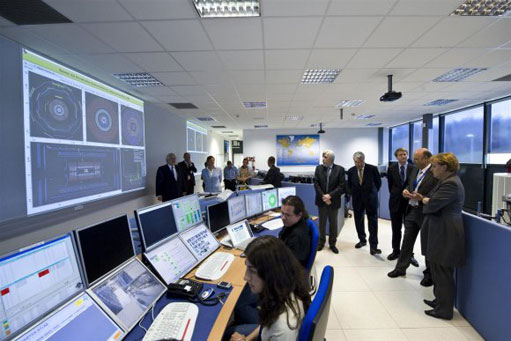
ATLAS e-News
23 February 2011
Angela Merkel Visits ATLAS
27 May 2008

Angela Merkel (far right) in the ATLAS control room
German Federal Chancellor Angela Merkel – described by some as “the most powerful woman in the world” – made an historic visit to CERN at the end of last month. During her brief 1.5 hours on site, she was taken on a whistle-stop tour of the ATLAS control room and cavern, and given the chance to look down on the experiment from a dizzying height of 100 metres, through the access shaft in the SX building.
As well as being introduced to members of CERN’s top management and ATLAS spokesperson, Peter Jenni, who guided her on the tour, Frau Merkel spent time with a group of 13 young German scientists currently working at CERN. ATLAS’s Sandra Horvat, a postdoc from the Max-Planck-Institut für Physik in Munich, was one of the lucky 13, and spoke with the Chancellor about the visible shell of the detector – the muon spectrometer – and the search for the elusive Higgs boson.
Herself a former physicist, Frau Merkel quickly grasped the principle behind the Monitored Drift Tubes in the muon chambers, and asked all the right questions, according to Sandra. “She was very interested to find out what the Higgs particle actually is and why it is so important to find it,” Sandra recalls. “After hearing that it is the only particle predicted by the Standard Model which hasn't been found yet, she questioned what would happen if we don’t find it.”
ATLAS Physics Coordinator Karl Jakobs promptly stepped up, giving her a concise explanation of the other theories and physics goals beyond the Standard Model, including supersymmetry and extra dimensions.
“Frau Merkel appeared to find the detector construction effort hugely impressive, and all the proposed research topics very intriguing, even asking questions about heavy ions and string theory,” remembers Sandra. “But I think the most powerful impression she took with her, after speaking with the young scientists, was of their great enthusiasm for their research, their willingness to work out of hours, and the eager anticipation here of the first LHC collisions.”

Ceri PerkinsATLAS e-News
|